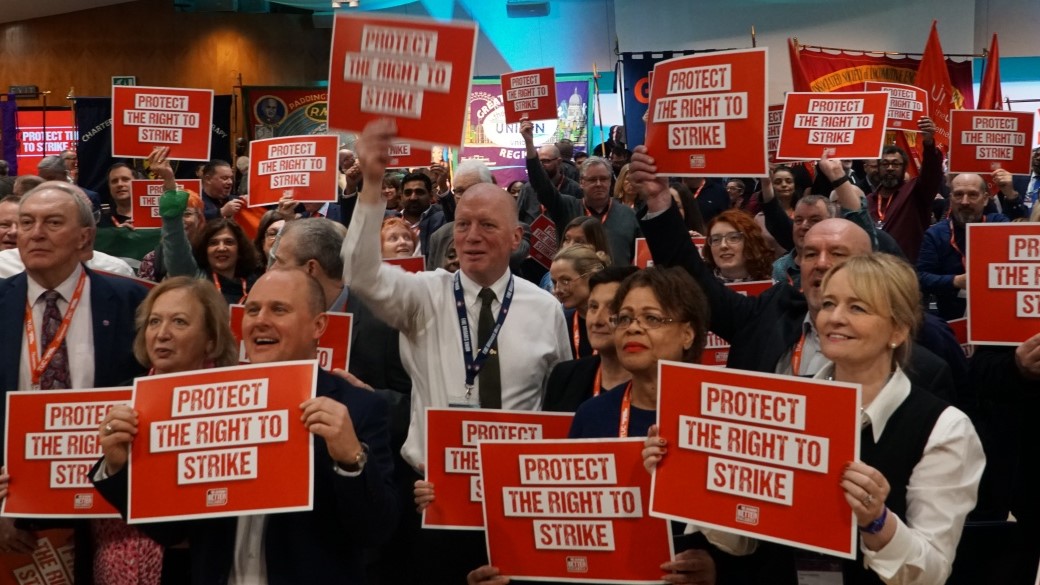Trade unions and left-wing sections in the UK are gearing up to challenge the anti-strike laws of the Tory government. The Strikes (Minimum Service Levels) Act 2023 passed on July 20 this year came into effect in some of the key sectors in the UK from December 8.
Major trade unions in the country, including Unite Union, Fire Brigades Union, National Education Union, Public and Commercial Services Union (PCS), UNISON, Communication Workers Union (CWU), and the National Union of Rail, and the Maritime and Transport Workers (RMT) gathered at the special conference of the Trade Union Congress (TUC) on December 9, Saturday, in London, and resolved to fight and defeat the anti-strike law.
With its partial enactment, the anti-worker legislation will effectively thwart strikes by enforcing minimum services and penalizing strikers in three of the eight intended key sectors — the ambulance service, rail network, and border security.
The Morning Star reported that the participants of the extraordinary TUC session voted unanimously to fight the anti-worker law. The session charted out action points, including backing any worker targeted in a work notice, mounting legal challenges to the new laws, and demanding that employers commit not to issue work notices during strike days.
The conference also called for a major rally to ‘Protect the right to strike’ on January 27, 2024, at Cheltenham. More than a dozen mayors and council leaders across Britain have also expressed their solidarity with the TUC resolution and vowed to “explore every possible option” to avoid issuing strike bans in their areas. The Scottish and Welsh governments have indicated that they will not serve Work Notices under the legislation either on their workers or on the recognized trade unions.
Major trade unionists like RMT’s Alex Gordon have stated that unions must make anti-strike laws inoperable. He urged more city councils and other local governments in the UK headed by opposition parties and the public and private-sector employers to block the execution of anti-strike legislation in their localities and sectors.
He stated that “even though as per the law, minimum service levels (MSL) will be implemented using new Work Notices served by the employers on individual workers whom they determine are necessary, the MSL legislation does not compel employers to serve Work Notices.”
Over the past few years and especially since 2022, vigorous strike actions have been carried out by unions in several major sectors including in railways, education, health, and communications demanding an effective pay rise to combat soaring inflation.
The working class section and low-income households in the country continue to grapple with a mounting cost of living crisis and the aftershocks of the COVID-19 crisis. Instead of listening to the demands of the trade unions and other popular sectors, the Conservative Party government under prime minister Rishi Sunak has resorted to using draconian anti-union, anti-strike measures including “Scab’s Charter” and various anti-strike laws.
The government introduced the controversial Strikes Bill in the parliament on January 10, 2023, which enables the state and private employers to force workers to ensure minimum service during trade union strikes across eight key sectors including health, ambulance, fire and rescue, security, education, and transport.
The bill would empower bosses to sack workers who refuse to provide a minimum level of service during walkouts across key sectors, as well as sue trade unions in court both to prevent strikes and claim damages. Despite fierce protest from unions and progressive sections, the Tories forced the legislation through the parliament.
Even though the Labor Party has announced that it will repeal the anti-strike law if it comes to power, many sectors within the trade union movement are suspicious about the promise as they are wary of the class allegiance of the “Labor aristocracy” headed by Keir Starmer.
On December 9, the Trade Union Congress (TUC) stated that “the Conservative government’s attack on working people may have finished its parliamentary stages, but the campaign against the Strikes Act continues. The government has adopted a reckless approach with its minimum service levels bill and the TUC will explore all options to fight this legislation including legal routes.”
“The right to strike is a fundamental British liberty that is vital for the balance of power in the workplace. We must defend it at all costs,” it added.
The TUC has also resolved to hold the Labour Party to its commitment to repeal anti-strike legislation within their first 100 days of office. While addressing the special conference of the TUC, RMT union’s Mick Lynch stated “We’ve got to act as one big union, we will act together to defend our trade union rights and defeat these minimum service laws”





